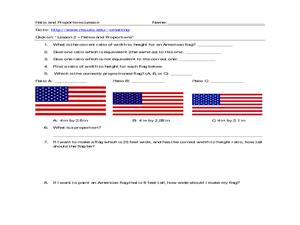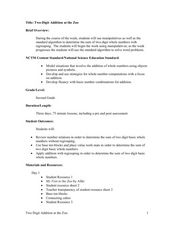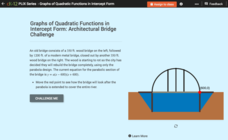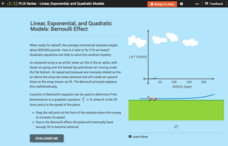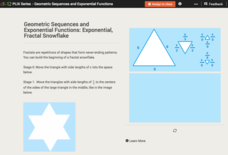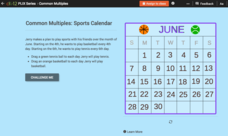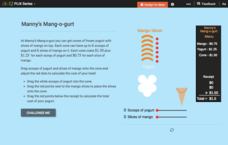Curated OER
Counting Area
In this math worksheet, students find the area of shapes by counting the number of grid paper squares inside each shape. This is a worksheet generator, the teacher controls the complexity of the shapes as well as the grid size. Answers...
Curated OER
Basic Fractions Practice A, B, & C
In these three recognizing fractions worksheets, students match fractions with their equivalent pictures, identify fractions and not fractions, and shade in the fractions from written and oral directions. Students solve 43 problems.
Curated OER
Basic Theorems and Proofs
In this pre-calculus learning exercise, 11th graders recall the three forms of the law of cosines and used it to solve problems involving triangles. They also write out the laws of sines and use those to solve problems with angles. There...
Curated OER
The American Flag-Basic Ratios and Proportions
Students solve problems with ratios and proportions. In this algebra lesson,students apply the concept of ratios and proportions to the real world.
Curated OER
Math: Graphs and Their Symbols
Second graders examine different types of graphs and discover the meanings of the symbols used on them. After gathering data about themselves, their communities, and the world, they use that information to create graphs. Among the...
Curated OER
Math and Numbers - Addition Table Exercise
In this addition worksheet, students fill in the blanks in the table with the correct sum. There are 121 blanks to fill in on this worksheet.
Curated OER
Math
Learners solve addition, subtraction, multiplication, and division problems that focus on serving size and counting 5 A Day.
Curated OER
Gummy Bear Math
First graders predict, collect data, and create a graph based on gummy bear colors they are given. In this graphing lesson plan, 1st graders first predict how many colors of gummy bears there are. They then count the colors, graph them,...
Curated OER
Basic Compass and Ruler Construction: Line Segment
In this construction worksheet, students utilize a compass and a ruler to reconstruct a line segment and to combine two line segments together in 2 questions.
Curated OER
Two-Digit Subtraction With and Without Regrouping
Second graders subtract two-digit numbers. In this mathematics lesson, 2nd graders subtract both with and without regrouping. Students use manipulatives and place value mats to assist in problem solving.
Curated OER
Two-Digit Addition at the Zoo
Your second graders explore two digit addition with regrouping. They will investigate problem solving strategies within the context of a trip to the zoo. Multiple resources and assessments are provided.
Texas Education Agency (TEA)
Geometry in Architecture #1
Discover how to analyze architecture from a geometric standpoint. The fourth installment of an 11-part unit on architecture first provides a presentation on axis, balance, basic form, formal, pattern, proportion, symmetry, and tripartite...
CK-12 Foundation
Graphs of Quadratic Functions in Intercept Form: Architectural Bridge Challenge
There are architectural parabolas all around us! A creative lesson analyzes the architecture of a parabolic bridge. Learners must manipulate the bridge to satisfy given criteria and then answer questions about the dimensions of the...
CK-12 Foundation
Linear, Exponential, and Quadratic Models: Bernoulli Effect
How can an object as heavy as an airplane fly? Turns out the answer is quadratic! Your classes explore the Bernoulli Effect through an interactive graph representation. As a plane increases in speed, the lift force also increases. Young...
CK-12 Foundation
Geometric Sequences and Exponential Functions: Bouncing Ball
Explore a geometric sequence model through a simulation. Learners change the starting drop height of a ball and watch how the heights of following bounces change. They consider the ratio of the consecutive bounces as they analyze the...
CK-12 Foundation
Exponential Growth: Exponential, Fractal Snowflakes
Examine an exponential growth model. Using a fractal, learners calculate the perimeters of each stage. When comparing the consecutive perimeters, a pattern emerges. They use the pattern to build an equation and make conclusions.
CK-12 Foundation
Scientific Notation: Light Years to Centaurus Constellation
Connect scientific notation to a real-life situation. Measuring distances in our solar system require large numbers. As pupils make conversions using these large numbers, they begin to see the necessity of scientific notation. They...
CK-12 Foundation
Common Multiples: Sports Calendar
Using a calendar, basketballs, and tennis balls, young mathematicians determine the common multiples of four and six. Individuals drag and drop the balls onto the correct dates each sport will be played, allowing them to see which days...
CK-12 Foundation
Direct Variation: Value of a Painting
Help your pupils find a pattern of direct variation. Young scholars use input-output pairs to find a constant of variation and then write the equation. As they build their equations, the interactive lesson provides feedback.
CK-12 Foundation
Using Quadratic Equations to Solve Problems: Construct a Soccer Field
Build a soccer field through a little mathematical analysis. Individuals manipulate the dimensions of a soccer field as they drag points to new positions. The simulation shows the corresponding intercepts and area. As pupils explore the...
CK-12 Foundation
Solving Problems by Factoring: Building a Doghouse
Building a doghouse is easier with a little mathematical help! Young scholars use sliders to adjust the length of the doghouse and watch as it affects the width and area. They then answer questions that help them discover the question...
CK-12 Foundation
Functions that Describe Situations: Manny's Mang-o-gurt
How much does it cost to add more mangos? An interactive allows users to see how the price of frozen yogurt changes based on the number of scoops and the number of slices of mango. Learners then answer a set of challenge questions about...
CK-12 Foundation
Visual Patterns: Building the Queen's Tower
A resource fit for a queen. Scholars recognize and continue a pattern in towers people are building for a queen. They write and use an algebraic expression for the number of tiles in the towers.
CK-12 Foundation
Applications Using Linear Models: Scuba Diving
Dive into this resource on rates of change and linear models. Pupils use two sliders in an interactive to adjust water temperature and depth. They use a given linear equation to calculate the rate of change in water temperature per unit...
Other popular searches
- Basic Math Skills
- Basic Math Computation
- Basic Math Facts
- Basic Math Equations
- Basic Math Games
- Basic Math Shapes
- Basic Math Test
- Basic Math Skills Pretest
- Basic Facts Math History
- Basic Math Addition
- Basic Math Skill Drills
- Basic Facts Math Lessons





